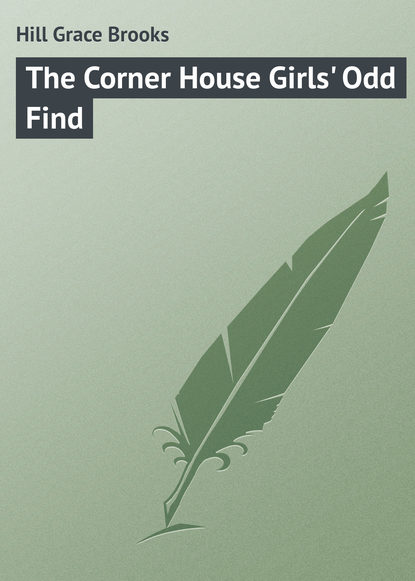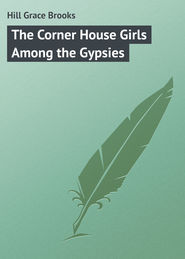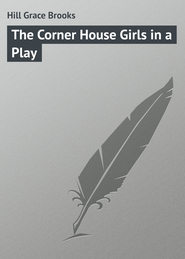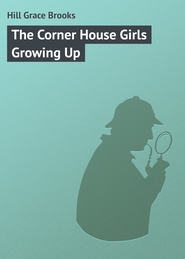По всем вопросам обращайтесь на: info@litportal.ru
(©) 2003-2024.
✖
The Corner House Girls' Odd Find
Настройки чтения
Размер шрифта
Высота строк
Поля
“Thought you said it was a family photograph album!” said Neale O’Neil.
With their heads close together they were looking into the moth-eaten and battered book Agnes had found in the old Corner House garret. On turning the first page a yellowed and time-stained document met their surprised gaze.
There was a picture engraved upon the document, true enough. Such an ornate certificate, or whatever it might be, Agnes or Neale had never even seen before.
“‘The Pittsburg & Washington Railroad Co.,’” read Neale, slowly. “Whew! Calls for a thousand dollars – good at any bank.”
“Sandbank, I guess it means,” giggled Agnes.
But Neale was truly puzzled. “I never saw a bond before, did you, Aggie?”
“A bond! What kind of a bond?”
“Why, the kind this is supposed to be.”
“Why, is it a bond?”
“Goodness! you repeat like a parrot,” snapped Neale.
“And you’re as polite as a – a pirate,” declared Agnes.
“Well, did you ever see anything like this?”
“No. And of course, it isn’t worth the paper it’s printed on. You know very well, Neale, that people don’t leave money around – loose – like this!”
“This isn’t money; it only calls for money,” said the boy.
“I guess it never called very loud for it,” giggled Agnes.
“Must be stage money, then,” laughed Neale. “Hi! here’s more of it.”
He had turned a leaf. There was another of the broad, important looking documents pasted in the old book.
“And good for another thousand dollars!” gasped Agnes.
“Phony – phony,” chuckled Neale, meaning that the certificates were counterfeit.
“But just see how good they look,” Agnes said wistfully.
“And dated more than sixty years ago!” cried Neale. “There were green-goods men in those days, eh? Hello! here’s another.”
“Why, we’re millionaires, Neale,” Agnes declared. “Oh! if it were only real we’d have an automobile.”
“This is treasure trove, sure enough,” her boy chum said.
“What’s that?”
“Whatever you find that seems to belong to nobody. I suppose this has been in the garret for ages. Hard for anybody to prove property now.”
“But it’s not real!”
“Yes – I know. But, if it were – ?”
“Oh! if it were!” repeated the girl.
“Wouldn’t that be bully?” agreed the boy. But he was puzzling over the mortgage bonds of a railroad which, if it had ever been built at all, was probably now long since in a receiver’s hands, and the bonds declared valueless.
“And all for a thousand apiece,” Neale muttered, turning the pages of the book and finding more of the documents. “Cracky, Aggie, there’s a slew of them.”
“But shouldn’t they be made out to somebody? Oughtn’t somebody’s name to be on them?” asked Agnes, thoughtfully.
“No, guess not. These must be unregistered bonds. I expect somebody once thought he was awfully rich with all this paper. It totes up quite a fortune, Aggie.”
“Oh, dear!” sighed Agnes. “I guess it’s true, Neale: The more you have the more you want. When we were so poor in Bloomingsburg it seemed as though if we had a dollar over at the end of the month, we were rich. Now that we have plenty – all we really need, I s’pose – I wish we were a little bit richer, so that we could have an auto, Neale.”
“Uh-huh!” said Neale, still feasting his eyes on the engraved bonds. “Cracky, Aggie! there’s fifty of ’em.”
“Goodness! Fifty thousand dollars?”
“All in your eye!” grinned Neale. “What do you suppose they ever pasted them into a scrap-book for?”
“That’s just it!” cried Agnes.
“What’s just it?”
“A scrap-book. I didn’t think of it before. They made this old album into a scrap-book.”
“Who did?” demanded the boy, curiously.
“Somebody. Children, maybe. Maybe Aunt Sarah Maltby might tell us something about it. And it will be nice for Tess and Dot to play with.”
“Huh!” grunted Neale.
“Of course that’s it,” added the girl, with more assurance. “It’s a scrap-book – like a postcard album.”
“Huh!” grunted Neale again, still doubtful.
“When Mrs. MacCall was a little girl, she says it was the fad to save advertising cards. She had a big book full.”
“Well – mebbe that’s it,” Neale said grudgingly. “Let’s see what else there is in the old thing.”
He began to flirt the pages toward the back of the book. “Why!” he exclaimed. “Here’s some real stage money. See here!”
“Oh! oh!”
“Doesn’t it look good?” said Neale, slowly.
“Just as though it had just come from the bank. What is it – Confederate money, Neale? Eva Larry has a big collection of Confederate bills. Her grandfather brought it home after the Civil War.”










